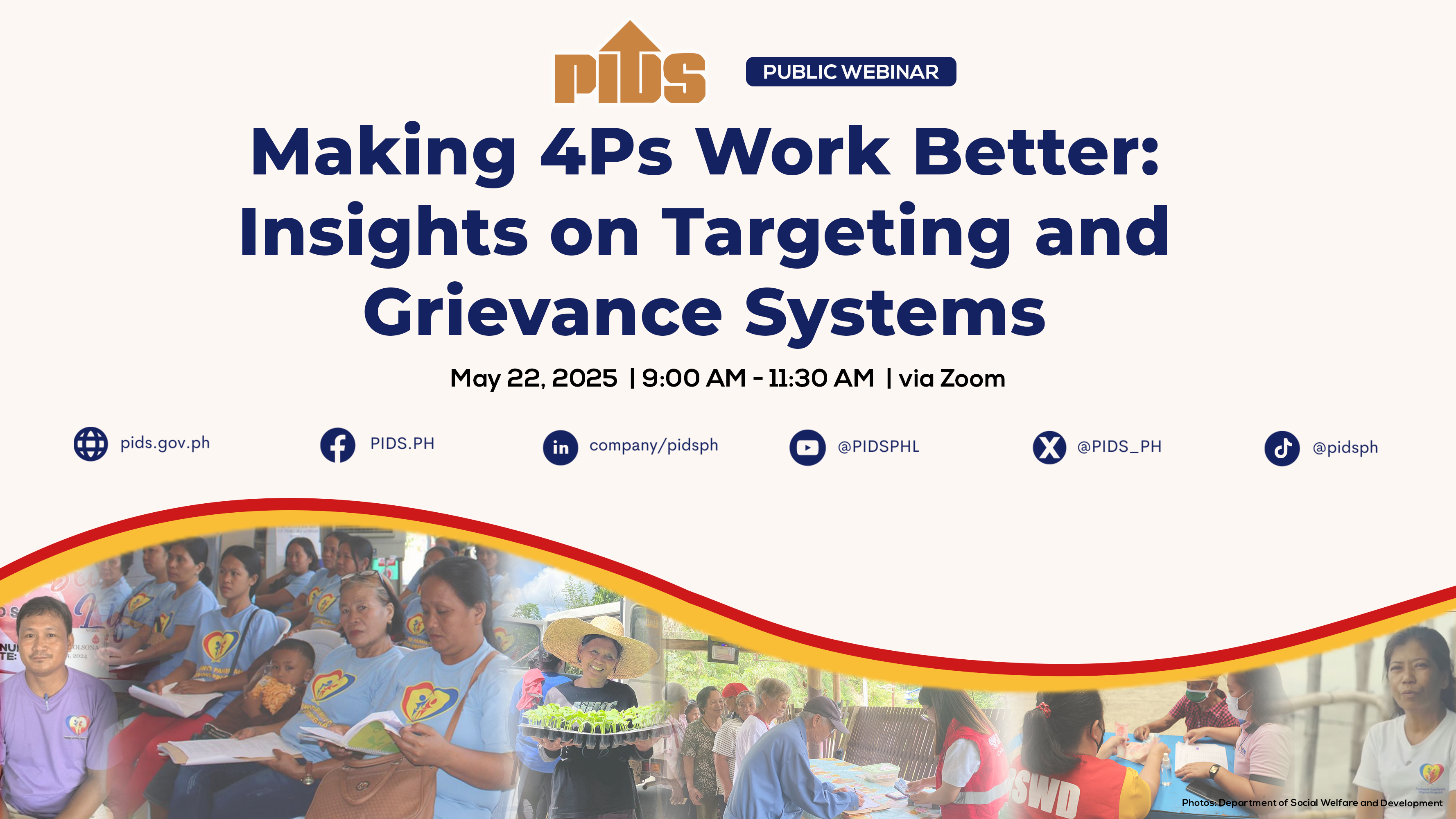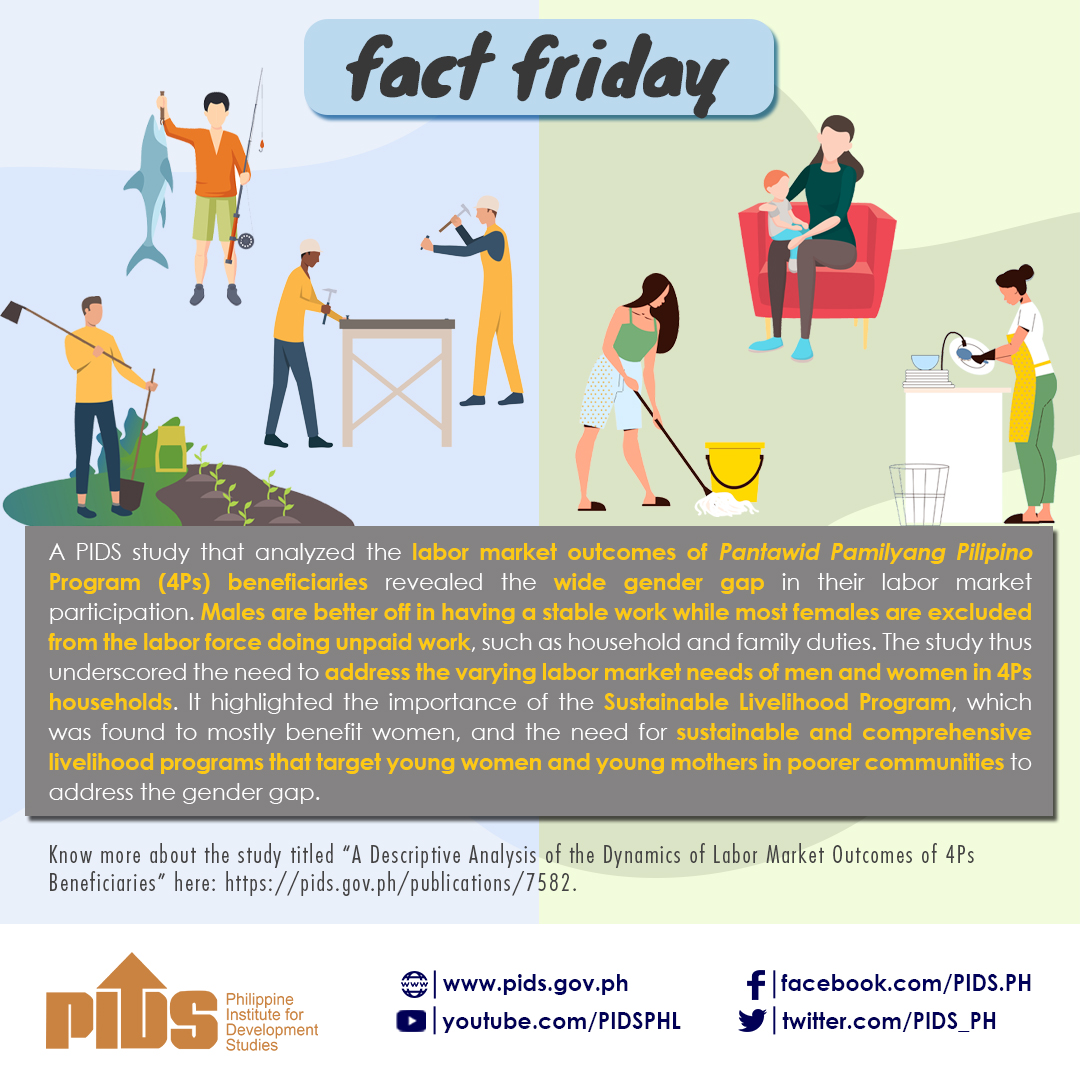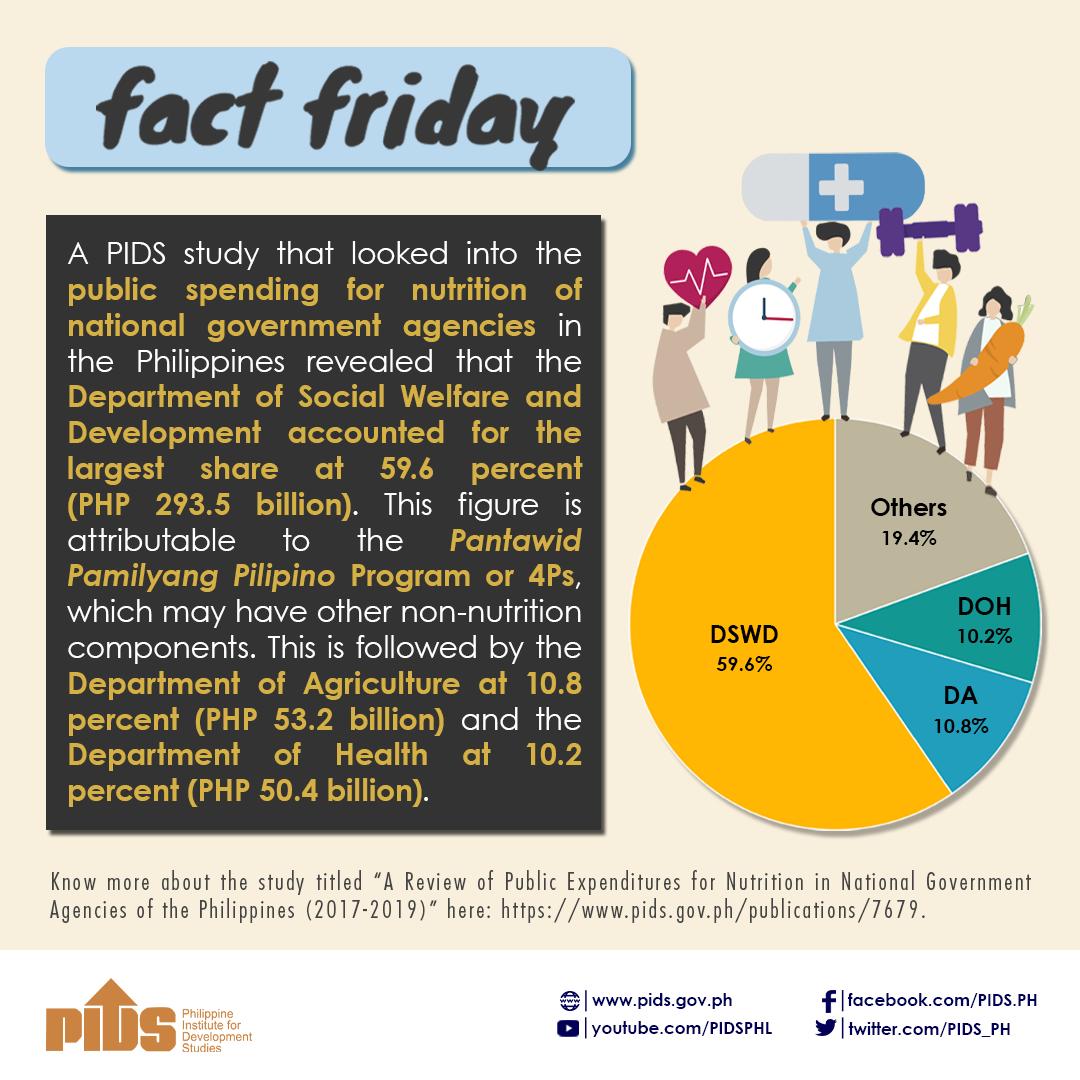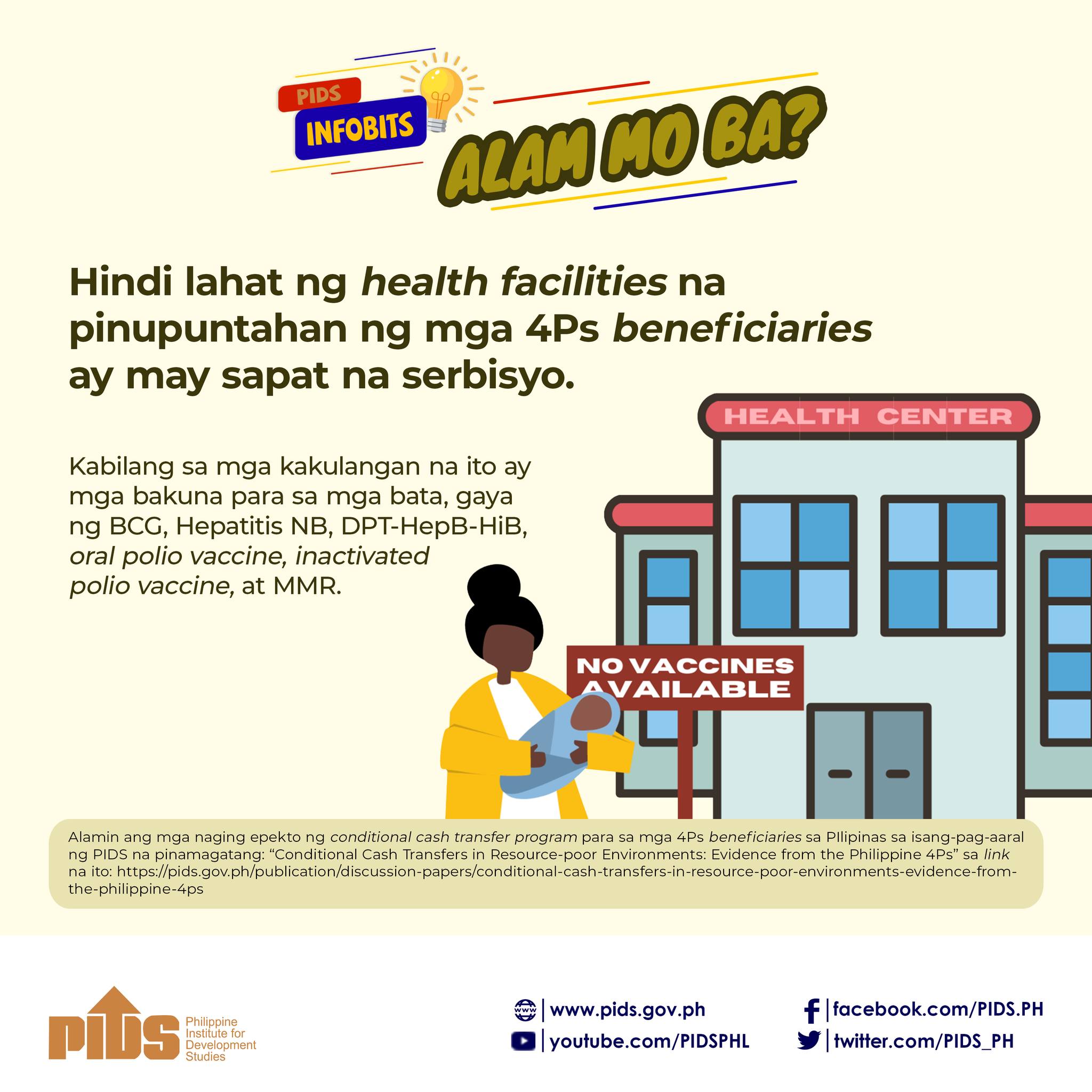TO make Pantawid Pamilyang Pilipino Program (4Ps) more effective in reducing poverty, the Philippine Institute for Development Studies (PIDS) has asked the government to refine the implementation conditional-cash transfers before institutionalizing the program.
In a briefing on the status of poverty, inequality, employment and health in the context of social-protection programs held at the House of Representatives, Celia Reyes, PIDS senior research fellow, said institutionalizing the 4Ps or the Conditional Cash Transfer (CCT) Program will have massive implications on the national budget.
Reyes said policy-makers should first refine the 4Ps by identifying areas in the program that need to be improved.
“The proportion of children attending school has been increasing over time [due to 4Ps]. This is something that is actually consistent. [However], the potential impact of such programs can be stunted when certain conditions are not fully considered,” Reyes said.
“Initially, while the 4Ps was designed to assist children ages 6 to14 years old, it has been noted that the school-participation rate for that age group is already very high. It is really in the older group where you have the problem,” she added.
According to Reyes there is also big disparity between the proportion of children aged 16 to18 years old who are attending school in the poorest decile, compared to children of the same age group in the richest decile.
“As we would expect, the average years of schooling would increase with income. So, that’s 11 years average schooling for those belonging in the richest decile, and only about five years for those belonging in the poorest decile. If you wanted to provide some assistance, you would really need to target the poorest,” Reyes said.
Shifting resources
Reyes also said to fine tune the CCT Program, the government should shift the assistance from elementary to high school, and revisit the amount of grants it provide for students.
“[We should] look at the possibility of shifting resources from elementary to high school and strengthening support at the high-school level as a policy starting point,” she said.
“It is no surprise that high-school graduates earn higher income, at about P284 a day, higher than those who are not high school graduates, at only about P171 per day. Meanwhile, those who are college graduates earn around P623 per day, while those who have completed post-graduate studies earn around P1,216 per day,” Reyes added.
Reyes said she is not recommending to extend the 4Ps to tertiary. However, she urged policy-makers to explore ways to link up 4Ps recipients and broaden their opportunity of reaching tertiary level of education.
She also said there should be different interventions or programs for chronic poor, or those people living in poverty over extended period of time, and for transient poor, or those who move in and out of poverty.
“Addressing the needs of the chronic poor requires structural and long-term solutions, like investing in education and human capital strategies. The transient poor, on the other hand, requires a different and more specific approach, not to mention the policy input of other government agencies and sectors—like labor, finance and disaster resilience—which are just as equally important to combating poverty,” Reyes added.
The 4Ps was first implemented during the administration of former President and now Lakas Rep. Gloria Arroyo of the Second District of Pampanga.
Status
Last February, the House of Representatives has approved on third and final reading a measure institutionalizing the 4Ps or the CCT, while the Senate version of the bill is still pending for committee approval.
The lower chamber version of the bill, principally authored by Nationalist People’s Coalition Rep. Susan Yap of Tarlac and Arroyo, seeks to break the intergenerational cycle of poverty through investment in human capital and improved delivery of basic services to the poor, particularly education, health and nutrition.
The measure also said that subject to certain conditions, each qualified household-beneficiary shall receive a CCT equivalent to P500 per month for health and nutrition expenses or the equivalent of P6,000 per qualified household-beneficiary per year.
A maximum of three children per qualified household-beneficiary shall be given conditional grant for educational expenses, it said.
The measure added that P300 per month per child enrolled in elementary, or the equivalent of P3,000 per 10-month school year; P500 per month per child in junior high school, or the equivalent of P5,000 per 10-month school year; P700 per month per child enrolled in senior-high school, or the equivalent of P7,000 per 10-month school year.
The bill said that a supplementary education grant of P300 per month shall be given to the child in elementary or high school who has maintained passing grades in all subjects after the second year of availment of the program.
For 2016, the government has allotted P64 billion for the CCT.//
In a briefing on the status of poverty, inequality, employment and health in the context of social-protection programs held at the House of Representatives, Celia Reyes, PIDS senior research fellow, said institutionalizing the 4Ps or the Conditional Cash Transfer (CCT) Program will have massive implications on the national budget.
Reyes said policy-makers should first refine the 4Ps by identifying areas in the program that need to be improved.
“The proportion of children attending school has been increasing over time [due to 4Ps]. This is something that is actually consistent. [However], the potential impact of such programs can be stunted when certain conditions are not fully considered,” Reyes said.
“Initially, while the 4Ps was designed to assist children ages 6 to14 years old, it has been noted that the school-participation rate for that age group is already very high. It is really in the older group where you have the problem,” she added.
According to Reyes there is also big disparity between the proportion of children aged 16 to18 years old who are attending school in the poorest decile, compared to children of the same age group in the richest decile.
“As we would expect, the average years of schooling would increase with income. So, that’s 11 years average schooling for those belonging in the richest decile, and only about five years for those belonging in the poorest decile. If you wanted to provide some assistance, you would really need to target the poorest,” Reyes said.
Shifting resources
Reyes also said to fine tune the CCT Program, the government should shift the assistance from elementary to high school, and revisit the amount of grants it provide for students.
“[We should] look at the possibility of shifting resources from elementary to high school and strengthening support at the high-school level as a policy starting point,” she said.
“It is no surprise that high-school graduates earn higher income, at about P284 a day, higher than those who are not high school graduates, at only about P171 per day. Meanwhile, those who are college graduates earn around P623 per day, while those who have completed post-graduate studies earn around P1,216 per day,” Reyes added.
Reyes said she is not recommending to extend the 4Ps to tertiary. However, she urged policy-makers to explore ways to link up 4Ps recipients and broaden their opportunity of reaching tertiary level of education.
She also said there should be different interventions or programs for chronic poor, or those people living in poverty over extended period of time, and for transient poor, or those who move in and out of poverty.
“Addressing the needs of the chronic poor requires structural and long-term solutions, like investing in education and human capital strategies. The transient poor, on the other hand, requires a different and more specific approach, not to mention the policy input of other government agencies and sectors—like labor, finance and disaster resilience—which are just as equally important to combating poverty,” Reyes added.
The 4Ps was first implemented during the administration of former President and now Lakas Rep. Gloria Arroyo of the Second District of Pampanga.
Status
Last February, the House of Representatives has approved on third and final reading a measure institutionalizing the 4Ps or the CCT, while the Senate version of the bill is still pending for committee approval.
The lower chamber version of the bill, principally authored by Nationalist People’s Coalition Rep. Susan Yap of Tarlac and Arroyo, seeks to break the intergenerational cycle of poverty through investment in human capital and improved delivery of basic services to the poor, particularly education, health and nutrition.
The measure also said that subject to certain conditions, each qualified household-beneficiary shall receive a CCT equivalent to P500 per month for health and nutrition expenses or the equivalent of P6,000 per qualified household-beneficiary per year.
A maximum of three children per qualified household-beneficiary shall be given conditional grant for educational expenses, it said.
The measure added that P300 per month per child enrolled in elementary, or the equivalent of P3,000 per 10-month school year; P500 per month per child in junior high school, or the equivalent of P5,000 per 10-month school year; P700 per month per child enrolled in senior-high school, or the equivalent of P7,000 per 10-month school year.
The bill said that a supplementary education grant of P300 per month shall be given to the child in elementary or high school who has maintained passing grades in all subjects after the second year of availment of the program.
For 2016, the government has allotted P64 billion for the CCT.//












